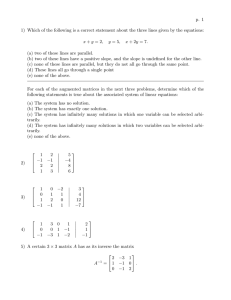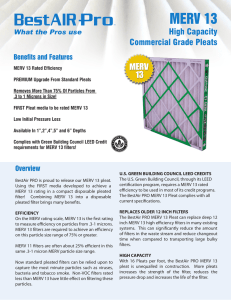LOYOLA COLLEGE (AUTONOMOUS), CHENNAI – 600 034
advertisement
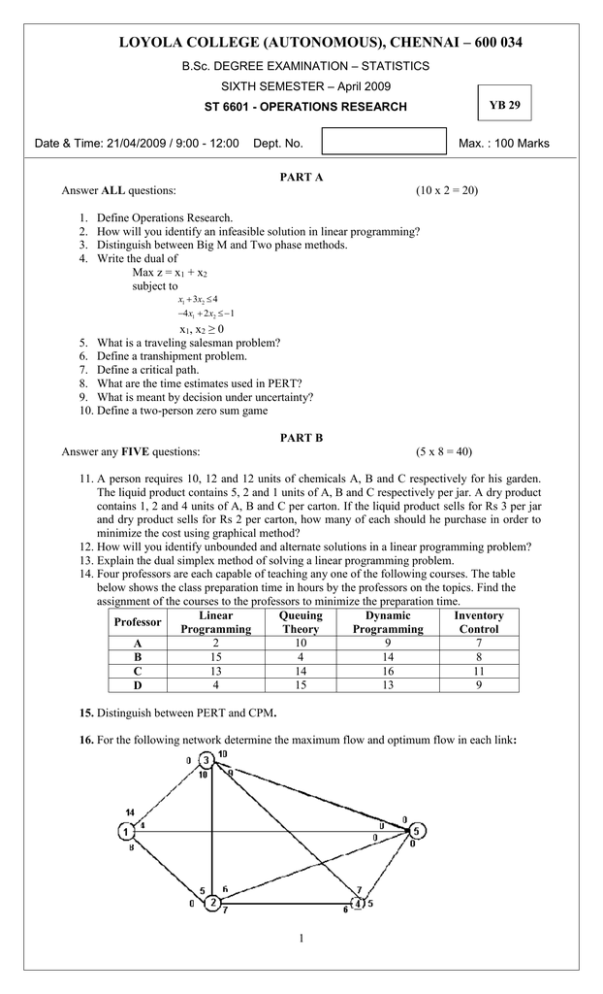
LOYOLA COLLEGE (AUTONOMOUS), CHENNAI – 600 034 B.Sc. DEGREE EXAMINATION – STATISTICS SIXTH SEMESTER – April 2009 YB 29 ST 6601 - OPERATIONS RESEARCH Date & Time: 21/04/2009 / 9:00 - 12:00 Dept. No. Max. : 100 Marks PART A Answer ALL questions: 1. 2. 3. 4. (10 x 2 = 20) Define Operations Research. How will you identify an infeasible solution in linear programming? Distinguish between Big M and Two phase methods. Write the dual of Max z = x1 + x2 subject to x1 3x2 4 4 x1 2 x2 1 x1, x2 ≥ 0 5. What is a traveling salesman problem? 6. Define a transhipment problem. 7. Define a critical path. 8. What are the time estimates used in PERT? 9. What is meant by decision under uncertainty? 10. Define a two-person zero sum game PART B Answer any FIVE questions: (5 x 8 = 40) 11. A person requires 10, 12 and 12 units of chemicals A, B and C respectively for his garden. The liquid product contains 5, 2 and 1 units of A, B and C respectively per jar. A dry product contains 1, 2 and 4 units of A, B and C per carton. If the liquid product sells for Rs 3 per jar and dry product sells for Rs 2 per carton, how many of each should he purchase in order to minimize the cost using graphical method? 12. How will you identify unbounded and alternate solutions in a linear programming problem? 13. Explain the dual simplex method of solving a linear programming problem. 14. Four professors are each capable of teaching any one of the following courses. The table below shows the class preparation time in hours by the professors on the topics. Find the assignment of the courses to the professors to minimize the preparation time. Linear Queuing Dynamic Inventory Professor Programming Theory Programming Control 2 10 9 7 A 15 4 14 8 B 13 14 16 11 C 4 15 13 9 D 15. Distinguish between PERT and CPM. 16. For the following network determine the maximum flow and optimum flow in each link: 1 17. Find the optimum strategy and value of the game for which there is no saddle point given the payoff matrix of A: a11 a12 a a 21 22 18. Explain minimax and savage criteria in decision making with suitable examples. PART – C Answer any TWO questions: (2 x 20 = 40) 19. (a) Explain primal-dual relationship in linear programming. (b) Use penalty method to Max z = 2x1 + x2 + 3x3 subject to x1 + x2 + 2x3 ≤ 5 2x1 + 3x2 + 4x3 = 12 x1 , x2 , x3 ≥ 0 20. (a) Solve the following transportation problem with cost coefficients, demand and supply as given below origin warehouse W1 W2 W3 W4 Supply O1 1 2 2 3 70 O2 2 4 0 1 38 O3 1 2 2 5 32 Demand 40 28 30 42 (b) Solve using simplex method Max Z = 10x1 + x2 + 2x3 subject to x1 + x2 – 2x3 10 4x1 + x2 + x3 20 x1, x2, x3 ≥ 0 21. (a) State the rules for drawing the network diagram. (b) The following table lists the jobs in a network along with the time estimates. Job 1–2 1–6 2–3 2–4 3–5 4–5 6–7 5–8 Optimistic 3 2 6 2 5 3 3 1 time (days) Most likely 6 5 12 5 11 6 9 4 time (days) Pessimistic 15 14 30 8 17 15 27 7 time (days) (i) Draw the network diagram (ii) Calculate the length and variance of the critical path (iii)Find the probability of completing the project before 31 days. 7-8 4 19 28 22. (a) A business man has three alternatives each of which can be followed by any one of the four possible events. The conditional payoff in rupees for each action – event combination are as given below: Payoff Alternative A B C D X 8 0 10 6 Y -4 12 18 -2 Z 14 6 0 8 Determine which alternative should the business man choose if he adopts (i) Hurwicz Criterion, the degree of optimism being 0.7 (ii) Laplace Criterion (b) Solve following game graphically: Player A 2 2 3 2 Player B 4 3 2 6 ************* 2
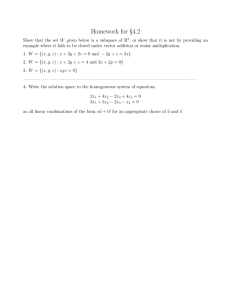
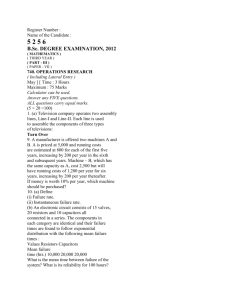
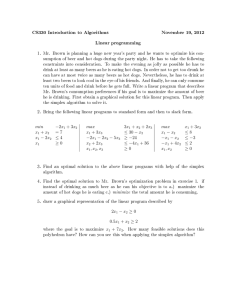
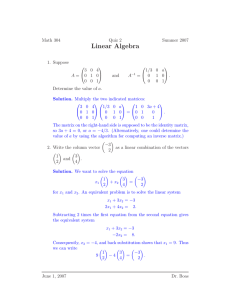
![Math 340–102 Fall 2000 [40 points total]](http://s2.studylib.net/store/data/011171267_1-a66260ba6ae57567a72fc3748d05703a-300x300.png)
